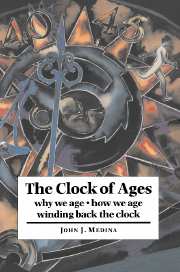Book contents
- Frontmatter
- Contents
- Preface
- To Doris Medina 1929–1993
- PART ONE Who ages?
- PART TWO How do we age?
- INTRODUCTION
- 4 How the skin and hair age
- 5 The aging of bones, muscles and joints
- 6 The aging of the brain
- 7 How the heart ages
- 8 The aging of the lungs
- 9 What happens to the digestion
- 10 How the senses age
- 11 The aging of the reproductive system
- PART THREE Why do we age?
- Further reading
- Index
10 - How the senses age
Published online by Cambridge University Press: 05 August 2012
- Frontmatter
- Contents
- Preface
- To Doris Medina 1929–1993
- PART ONE Who ages?
- PART TWO How do we age?
- INTRODUCTION
- 4 How the skin and hair age
- 5 The aging of bones, muscles and joints
- 6 The aging of the brain
- 7 How the heart ages
- 8 The aging of the lungs
- 9 What happens to the digestion
- 10 How the senses age
- 11 The aging of the reproductive system
- PART THREE Why do we age?
- Further reading
- Index
Summary
It was not the most welcoming way to be born into the planet.
The doctors thought that Samuel Johnson, the great author and conversationalist, was still-born. Fortunately for Western literature, he was not abandoned. The future writer was shaken, slapped, cajoled, yelled at and paddled until he convincingly shrieked his vitality into existence. The events of his birth were simply a foreshadowing of a troubled medical future, however. Samuel Johnnson would not die until the age of 75, and not until he had experienced most of the known ailments and diseases of his day.
As a baby, Samuel Johnson contracted tuberculosis and developed a glandular infection of the neck. In his later years he suffered asthma, dropsy, emphysema, gallstones, gout, hydrocele (swelling of the scrotum), manic depression, a diseased bladder which left him incontinent and chronic bronchitis. ‘My health seldom afforded me a single day of ease,’ Johnson wrote about his troubles.
His senses were not left untouched, either. His bouts with disease left him blind in one eye and partially deaf. There was a point when Johnson suffered aphasia, a temporary loss of speech, probably due to a cerebral hemorrhage. The only sense that seemed to amplify with the passing years was a constant feeling of pain.
Despite these sensory losses, Johnson was able to live through the better part of seven decades, an astonishing achievement for anyone living in the 18th century.
- Type
- Chapter
- Information
- The Clock of AgesWhy We Age, How We Age, Winding Back the Clock, pp. 185 - 208Publisher: Cambridge University PressPrint publication year: 1996



